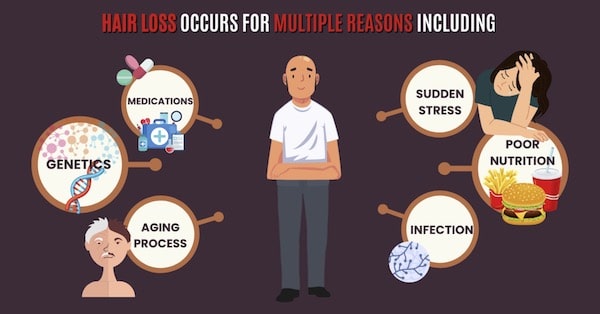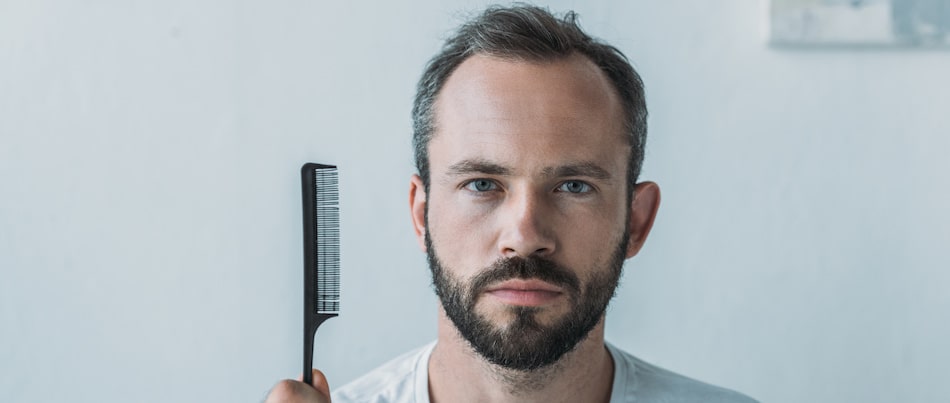The loss of hair on the scalp can be the result of a number of factors that impact the amount of hair that is on the head of a male or female patient. Even with hair loss occurring on the scalp, patients have a number of treatment options available to them as will be revealed in this informative article.
Hair Loss – Reasons Why it Happens
When it comes to hair loss on the scalp, the public normally thinks of baldness that results in excessive hair loss on the scalp. Some of the causes for hair loss include heredity/genetics, changes in the hormones, the aging process, and even certain medical conditions. People who experience hair loss might try to alter their hairstyle to cover their hair loss or they might wear a hat on a regular basis.

Hair loss can be a condition that appears gradually, or it can suddenly and quickly impact the scalp. Here are some of the common signs and symptoms of hair loss on the scalp:
- The gradual thinning of hair on the scalp happens as people continue to age. Men often begin to see a receding of the hair at the hairline on the forehead while females usually have a broader look to the part in their hair.
- Hormonal changes that lead to a loss of hair on the scalp include changes due to pregnancy, thyroid problems, and menopause.
- Poor nutrition or a poor diet can lead to the hair becoming brittle as well as hair loss on the scalp.
- Medical conditions that lead to hair loss include alopecia areata which is an autoimmune disease, a hair pulling mental disorder known as trichotillomania, and scalp infections such as ringworm.
- Intense emotional or physical shock or stress can cause hair loss on the scalp of a person.
- Hair loss can be a side effect of taking certain medications used to treat cancer, arthritis, and heart problems.
- Hairstyles that pull the hair tight on a regular basis, such as a ponytail, can cause a loss of hair in the area where the hair is being tightly pulled on an ongoing basis.
Hair Loss – How to Treat It
 Once hair loss begins on the scalp, the condition might be able to be reversed or slowed down. Here are some of the most effective hair loss treatments available to patients:
Once hair loss begins on the scalp, the condition might be able to be reversed or slowed down. Here are some of the most effective hair loss treatments available to patients:
- There are some medical hair loss treatments that promote hair growth on the scalp and they include minoxidil (Rogaine) and finasteride (Propecia). Minoxidil is available in foam, liquid, and shampoo forms and needs to be applied to the scalp on a daily basis. Finasteride is a prescription drug that is in the form of a pill and is used by male patients on a daily basis to slow hair loss. Both medications promote hair growth, but they also must be used on an ongoing basis to maintain the results. If the patient stops using these medications, their level of hair loss will return to the same condition on the scalp that was present before the use of the medications.
- The most long-lasting and permanent hair loss treatment is a hair transplant. During this surgical procedure, the surgeon will take hair follicles from elsewhere on the body of the patient and transplant them into the thinning or balding sections of the scalp. The hair that is transplanted will start to grow in the scalp and become fuller and thicker as it grows. The transplanted hair is usually taken from the back and sides of the scalp of the patient as the hair in this area has proven to be resistant to balding. If the patient does not have enough donor hair in this area, the hair follicles can be taken from other sections of the body such as the beard or chest. The donor hair has to come from the body of the actual patient so a person who is experiencing hair loss is not able to get donor hair from a friend or family member.
- It has been reported that the U.S. Food and Drug Administration has approved the use of a low-level laser device as a treatment option for hereditary hair loss in both male and female patients. While there have been a few small studies that have shown the low-level laser device can improve the density of the hair, there will need to be more studies conducted to show the long-term effects of this treatment option.
Hair Loss – Meeting with a Doctor
Once a patient decides to treat their hair loss, they will need to schedule a consultation appointment with a doctor who specializes in treating skin problems (such as a dermatologist) or a board-certified and trained hair transplant surgeon. The doctor will examine the scalp to determine the cause of the hair loss along with the best medical option for treating the condition. The doctor will also share the type of results the patient can expect to see after the treatment and also give them tips for maintaining a healthy and full head of hair.
- MA


 Once hair loss begins on the scalp, the condition might be able to be reversed or slowed down. Here are some of the most effective hair loss treatments available to patients:
Once hair loss begins on the scalp, the condition might be able to be reversed or slowed down. Here are some of the most effective hair loss treatments available to patients: